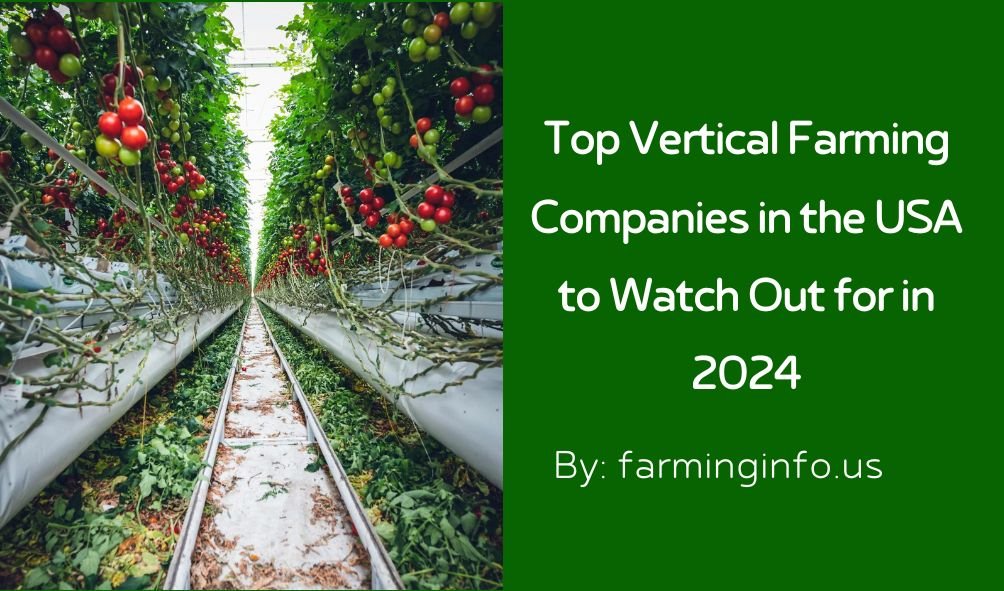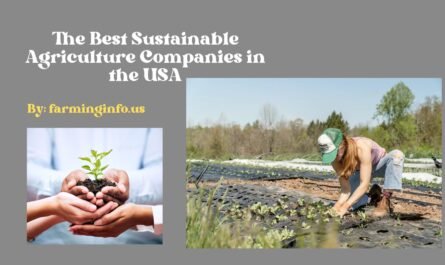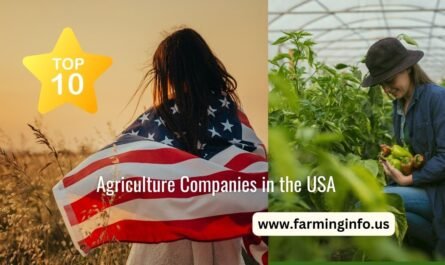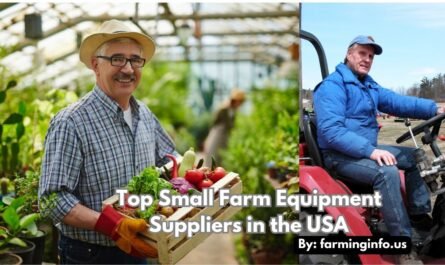Top Vertical Farming Companies in the USA in 2024! Vertical farming is an innovative and sustainable method of growing crops in vertically stacked layers, using artificial lighting and controlled environments. This practice has gained popularity in recent years due to its potential to address food security, environmental concerns, and limited arable land.
In the United States, several companies have emerged as leaders in the field of vertical farming, utilizing cutting-edge technology and sustainable practices. In this article, we will explore some of the top vertical farming companies in the USA to watch out for in 2024.

About Vertical Farming: Cultivating the Future of Agriculture
Vertical farming is an innovative approach to agriculture that involves growing crops in vertically stacked layers. This method stands in stark contrast to traditional horizontal farming, where crops are cultivated on flat land.
By maximizing space utilization, vertical farming offers several advantages and holds immense potential for addressing global food challenges.
How Does Vertical Farming Work?
Vertical farms typically employ controlled-environment agriculture (CEA) techniques to optimize plant growth. This involves precise control over factors such as temperature, humidity, light, and nutrient levels. Common methods include:
- Hydroponics: Growing plants without soil, using nutrient-rich water solutions.
- Aeroponics: Cultivating plants in an air or mist environment, without soil or water.
- Aquaponics: Combining hydroponics with aquaculture (fish farming) to create a symbiotic system.
Advantages of Vertical Farming
- Increased Yield: Vertical farms can produce significantly higher yields per square foot compared to traditional farming.
- Year-Round Production: Controlled environments allow for consistent crop production regardless of weather conditions.
- Reduced Water Consumption: Hydroponic and aeroponic systems often use significantly less water than traditional farming methods.
- Minimal Pesticide Use: Indoor farming environments can minimize the need for pesticides and herbicides.
- Land Conservation: Vertical farms can be built on a variety of sites, including urban areas, reducing pressure on agricultural land.
- Fresh, Local Produce: Vertical farms can bring fresh, locally grown food to urban populations.
Challenges of Vertical Farming
- High Initial Costs: Setting up a vertical farm requires significant investments in technology and infrastructure.
- Energy Consumption: Artificial lighting and climate control can lead to high energy consumption.
- Limited Crop Variety: While technology is advancing, some crops may still be challenging to grow vertically.
- Technical Expertise: Vertical farming requires specialized knowledge and skills to manage complex systems.
The Future of Vertical Farming
Vertical farming is poised to revolutionize the agricultural industry. Here’s a look at its promising future:
- Increased Adoption: Expect a surge in vertical farming operations, both large-scale commercial ventures and smaller urban farms.
- Technological Advancements: Continued development in areas like artificial intelligence, robotics, and precision agriculture will optimize crop growth and resource utilization.
- Urban Integration: Vertical farms will become an integral part of urban landscapes, providing fresh produce and reducing reliance on long-distance transportation.
- Diverse Crop Production: Expansion beyond leafy greens to include a wider variety of crops, including fruits, vegetables, and potentially even meat alternatives.
- Environmental Impact: Vertical farming will play a crucial role in mitigating climate change through reduced water consumption, land use, and pesticide usage.
- Economic Opportunities: The industry will create new jobs and economic growth, especially in urban areas.
- Global Food Security: Vertical farming can contribute to addressing food shortages and malnutrition in densely populated regions.
- Consumer Acceptance: As awareness grows, consumer demand for vertically farmed produce is likely to increase.
Top Vertical Farming Companies in the USA
The United States is at the forefront of this innovative approach, with a growing number of companies making significant strides. Here are the top 10 vertical farming companies in the USA to watch out for in 2024:
1. Gotham Greens
Gotham Greens is a leading urban agriculture company based in New York City. They specialize in high-tech greenhouse farming, utilizing hydroponic systems to grow a wide range of leafy greens and herbs.
With multiple locations across the country, including New York, Chicago, Denver, and Baltimore, Gotham Greens is known for its sustainable practices and commitment to providing locally grown, pesticide-free produce. By using renewable energy sources and advanced irrigation systems, they are able to minimize their environmental impact while maximizing crop yields.
2. AeroFarms
AeroFarms is a pioneer in the field of vertical farming, known for its advanced aeroponic technology. Based in Newark, New Jersey, AeroFarms grows a variety of leafy greens and herbs in vertically stacked trays, using a misting system to deliver nutrients directly to the plant roots.
Their state-of-the-art facilities are designed to optimize plant growth, with precise control over lighting, temperature, and humidity. AeroFarms focuses on sustainable practices, such as using 95% less water and no pesticides compared to traditional farming methods.
3. Bowery Farming
Bowery Farming is a vertical farming companies based in New York City that aims to revolutionize the agriculture industry. They utilize a combination of hydroponics, automation, and machine learning to grow a wide range of crops, including leafy greens, tomatoes, and strawberries.
With their indoor vertical farms located in New Jersey and Maryland, Bowery Farming can provide fresh, locally grown produce year-round. By eliminating the need for pesticides and reducing water usage, they are able to produce high-quality, sustainable crops that are free from contaminants.
4. Plenty
Plenty is a vertical farming companies headquartered in South San Francisco, California. They are known for their use of vertical towers, which allow for efficient use of space and high crop yields. Plenty focuses on growing a variety of leafy greens, including lettuce, kale, and spinach.
By controlling every aspect of the growing process, from lighting to nutrient delivery, they can optimize plant growth and ensure consistent quality. Plenty’s farms are strategically located near urban centers, reducing transportation costs and providing fresh produce to local communities.
5. Vertical Harvest
Vertical Harvest is a unique vertical farming company based in Jackson, Wyoming. What sets them apart is their focus on employing individuals with disabilities, providing them with meaningful employment opportunities.
Vertical Harvest utilizes hydroponic systems to grow a variety of crops, including microgreens, herbs, and tomatoes. Their three-story greenhouse is designed to maximize space utilization and energy efficiency, while also providing a positive social impact.
Vertical Harvest is not only committed to sustainable farming but also to creating inclusive communities.
6. Freight Farms
Freight Farms is a US-based company that creates hydroponic farms inside shipping containers. They offer a complete system including the container, farming technology, and software for management. These container farms can be placed almost anywhere, making fresh produce accessible in various locations.
Freight Farms offers containerized vertical farms that can be placed in urban or rural areas. Their modular design and focus on accessibility have made them popular among farmers and entrepreneurs.
7. Oishii
Oishii is a US-based vertical farming company specializing in strawberries. They are known for producing high-quality, flavorful strawberries year-round using indoor vertical farming techniques.
Oishii focuses on creating unique strawberry varieties and has gained recognition for its innovative approach to growing produce.
Oishii specializes in growing high-quality strawberries indoors using hydroponics and LED lighting. Their commitment to flavor and sustainability has earned them a loyal customer base.
8. FarmUp
FarmUp is a company focused on providing vertical farming solutions and technology. They offer systems that allow individuals or businesses to set up their own vertical farms. FarmUp’s goal is to make vertical farming accessible and scalable for a wide range of users.
FarmUp offers modular vertical farming systems that can be customized to fit various spaces. Their focus on affordability and scalability has made them attractive to urban farmers and entrepreneurs.
9. 80 Acres Farms
80 Acres Farms is a leading vertical farming company focused on producing fresh, pesticide-free produce at scale. They utilize advanced technology and data analytics to grow a wide variety of crops indoors, using significantly less water and land compared to traditional farming methods.
80 Acres Farms has partnered with major retailers and is known for its commitment to sustainability and food safety.
80 Acres Farms utilizes a combination of hydroponics, aeroponics, and LED lighting to grow a wide range of crops indoors. Their focus on data-driven farming and product innovation has positioned them as a key player.
10. Square Roots
Square Roots is a vertical farming company that focuses on urban agriculture. They utilize shipping containers converted into indoor farms to grow fresh produce in cities. Square Roots also operates an accelerator program to train new farmers and support the growth of urban agriculture.
Square Roots focuses on urban agriculture, operating containerized farms in cities across the country. Their commitment to local food production and community engagement has made them a popular choice for consumers.
Conclusion
As the demand for locally grown, sustainable produce continues to rise, vertical farming companies in the USA are at the forefront of this agricultural revolution. Companies like Gotham Greens, AeroFarms, Bowery Farming, Plenty, and Vertical Harvest are leading the way with their innovative approaches and commitment to sustainability.
By utilizing advanced technology, minimizing environmental impact, and providing fresh, pesticide-free produce, these companies are shaping the future of farming. Keep an eye on these top vertical farming companies in the USA as they continue to make a significant impact on the agriculture industry in 2024 and beyond.


